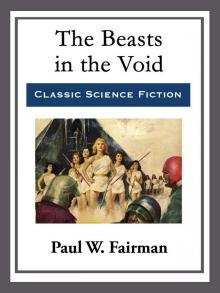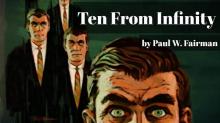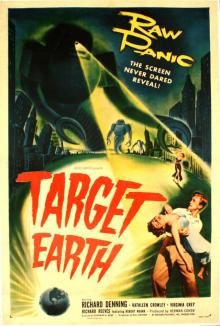- Home
- Paul W. Fairman
Deadly City Page 2
Deadly City Read online
Page 2
with complete impersonality.
She shouldn't look as good as she did--not after the beating she'dtaken. Not after the long nights and the days and the years, even thoughthe years did not add up to very many.
I could be someone's wife, she thought, with wry humor. I could besending kids to school and going out to argue with the grocer about thetomatoes being too soft. I don't look bad at all.
She raised her eyes until they were staring into their own images in theglass and she spoke aloud in a low, wondering voice. She said, "Who thehell am I, anyway? Who am I? A body named Linda--that's who I am.No--that's _what_ I am. A body's not a _who_--it's a _what_. One hundredand fourteen pounds of well-built blond body called Linda--model1931--no fender dents--nice paint job. Come in and drive me away. Pricetag--"
She bit into the lower lip she'd just finished reddening and turnedquickly to walk to the bed and wriggle into her dress--a gray and greencotton--the only one she had. She picked up her bag and went to thedoor. There she stopped to turn and thumb her nose at the three sleepingpills in the bottle before she went out and closed the door afterherself.
The desk clerk was away from the cubbyhole from which he presided overthe lobby, and there were no loungers to undress her as she walkedtoward the door.
Nor was there anyone out in the street. The girl looked north and south.No cars in sight either. No buses waddling up to the curb to spew outpassengers.
The girl went five doors north and tried to enter a place called Tim'sHamburger House. As the lock held and the door refused to open, she sawthat there were no lights on inside--no one behind the counter. Theplace was closed.
She walked on down the street followed only by the lonesome sound of herown clicking heels. All the stores were closed. All the lights were out.
_All the people were gone._
* * * * *
He was a huge man, and the place of concealment of the Chicago Avenuepolice station was very small--merely an indentation low in the cementwall behind two steam pipes. The big man had lain in this niche forforty-eight hours. He had slugged a man over the turn of a card in apoolroom pinochle game, had been arrested in due course, and wasawaiting the disposal of his case.
He was sorry he had slugged the man. He had not had any deep hatred forhim, but rather a rage of the moment that demanded violence as itsoutlet. Although he did not consider it a matter of any greatimportance, he did not look forward to the six month's jail sentence hewould doubtless be given.
His opportunity to hide in the niche had come as accidentally and assuddenly as his opportunity to slug his card partner. It had come afterthe prisoners had been advised of the crisis and were being herded intovans for transportation elsewhere. He had snatched the opportunitywithout giving any consideration whatever to the crisis. Probablybecause he did not have enough imagination to fear anything--howeverterrible--which might occur in the future. And because he treasured hisfreedom above all else. Freedom for today, tomorrow could take care ofitself.
Now, after forty-eight hours, he writhed and twisted his huge body outof the niche and onto the floor of the furnace room. His legs were numband he found that he could not stand. He managed to sit up and was ableto bend his back enough so his great hands could reach his legs andbegin to massage life back into them.
So elementally brutal was this man that he pounded his legs until theywere black and blue, before feeling returned to them. In a few minuteshe was walking out of the furnace room through a jail house which shouldnow be utterly deserted. But was it? He went slowly, gliding along closeto the walls to reach the front door unchallenged.
He walked out into the street. It was daylight and the street wascompletely deserted. The man took a deep breath and grinned. "I'll bedamned," he muttered. "I'll be double and triple damned. They're allgone. Every damn one of them run off like rats and I'm the only oneleft. I'll be damned!"
A tremendous sense of exultation seized him. He clenched his fists andlaughed loud, his laugh echoing up the street. He was happier than hehad ever been in his quick, violent life. And his joy was that of achild locked in a pantry with a huge chocolate cake.
He rubbed a hand across his mouth, looked up the street, began walking."I wonder if they took all the whisky with them," he said. Then hegrinned; he was sure they had not.
He began walking in long strides toward Clark Street. In toward thestill heart of the empty city.
* * * * *
He was a slim, pale-skinned little man, and very dangerous. He was alsovery clever. Eventually they would have found out, but he had beenclever enough to deceive them and now they would never know. There wasgreat wealth in his family, and with the rest of them occupied withleaving the city and taking what valuables they could on such shortnotice, he had been put in charge of one of the chauffeurs.
The chauffeur had been given the responsibility of getting thepale-skinned young man out of the city. But the young man had causedseveral delays until all the rest were gone. Then, meekly enough, he hadaccompanied the chauffeur to the garage. The chauffeur got behind thewheel of the last remaining car--a Cadillac sedan--and the young man hadgotten into the rear seat.
But before the chauffeur could start the motor, the young man hit him onthe head with a tire bar he had taken from a shelf as they had enteredthe garage.
The bar went deep into the chauffeur's skull with a solid sound, andthus the chauffeur found the death he was in the very act of fleeing.
The young man pulled the dead chauffeur from the car and laid him on thecement floor. He laid him down very carefully, so that he was in theexact center of a large square of outlined cement with his feet pointingstraight north and his outstretched arms pointing south.
The young man placed the chauffeur's cap very carefully upon his chest,because neatness pleased him. Then he got into the car, started it, andheaded east toward Lake Michigan and the downtown section.
After traveling three or four miles, he turned the car off the road anddrove it into a telephone post. Then he walked until he came to somehigh weeds. He lay down in the weeds and waited.
He knew there would probably be a last vanguard of militia hunting forstragglers. If they saw a moving car they would investigate. They wouldtake him into custody and force him to leave the city.
This, he felt, they had no right to do. All his life he had been orderedabout--told to do this and that and the other thing. Stupid orders fromstupid people. Idiots who went so far as to claim the whole city wouldbe destroyed, just to make people do as they said. God! The ends towhich stupid people would go in order to assert their wills overbrilliant people.
The young man lay in the weeds and dozed off, his mind occupied with thepleasant memory of the tire iron settling into the skull of thechauffeur.
After a while he awoke and heard the cars of the last vanguard passingdown the road. They stopped, inspected the Cadillac and found itserviceable. They took it with them, but they did not search the weedsalong the road.
When they had disappeared toward the west, the young man came back tothe road and began walking east, in toward the city.
Complete destruction in two days?
Preposterous.
The young man smiled.
* * * * *
The girl was afraid. For hours she had walked the streets of the emptycity and the fear, strengthened by weariness, was now mounting towardterror. "One face," she whispered. "Just one person coming out of ahouse or walking across the street. That's all I ask. Somebody to tellme what this is all about. If I can find one person, I won't be afraidany more."
And the irony of it struck her. A few hours previously she had attemptedsuicide. Sick of herself and of all people, she had tried to end her ownlife. Therefore, by acknowledging death as the answer, she should nowhave no fear whatever of anything. Reconciled to crossing the bridgeinto death, no facet of life should have held terror for her.
But the empty city did hold t
error. One face--one moving form was allshe asked for.
Then, a second irony. When she saw the man at the corner of Washingtonand Wells, her terror increased. They saw each other at almost the samemoment. Both stopped and stared. Fingers of panic ran up the girl'sspine. The man raised a hand and the spell was broken. The girl turnedand ran, and there was more terror in her than there had been before.
She knew how absurd this was, but still she ran blindly. What had she tofear? She knew all about men; all the things men could do they hadalready done to her. Murder was the ultimate, but she was fresh from asuicide attempt. Death should hold no terrors for her.
She thought of these things as the man's footsteps sounded behind herand she turned into a narrow alley seeking a hiding place. She foundnone and the man turned in after her.
She found a passageway, entered with the same blindness which hadbrought her into the alley. There was a steel door at the end and abrick lying by the sill.

 The Beasts in the Void
The Beasts in the Void Ten From Infinity
Ten From Infinity Deadly City
Deadly City